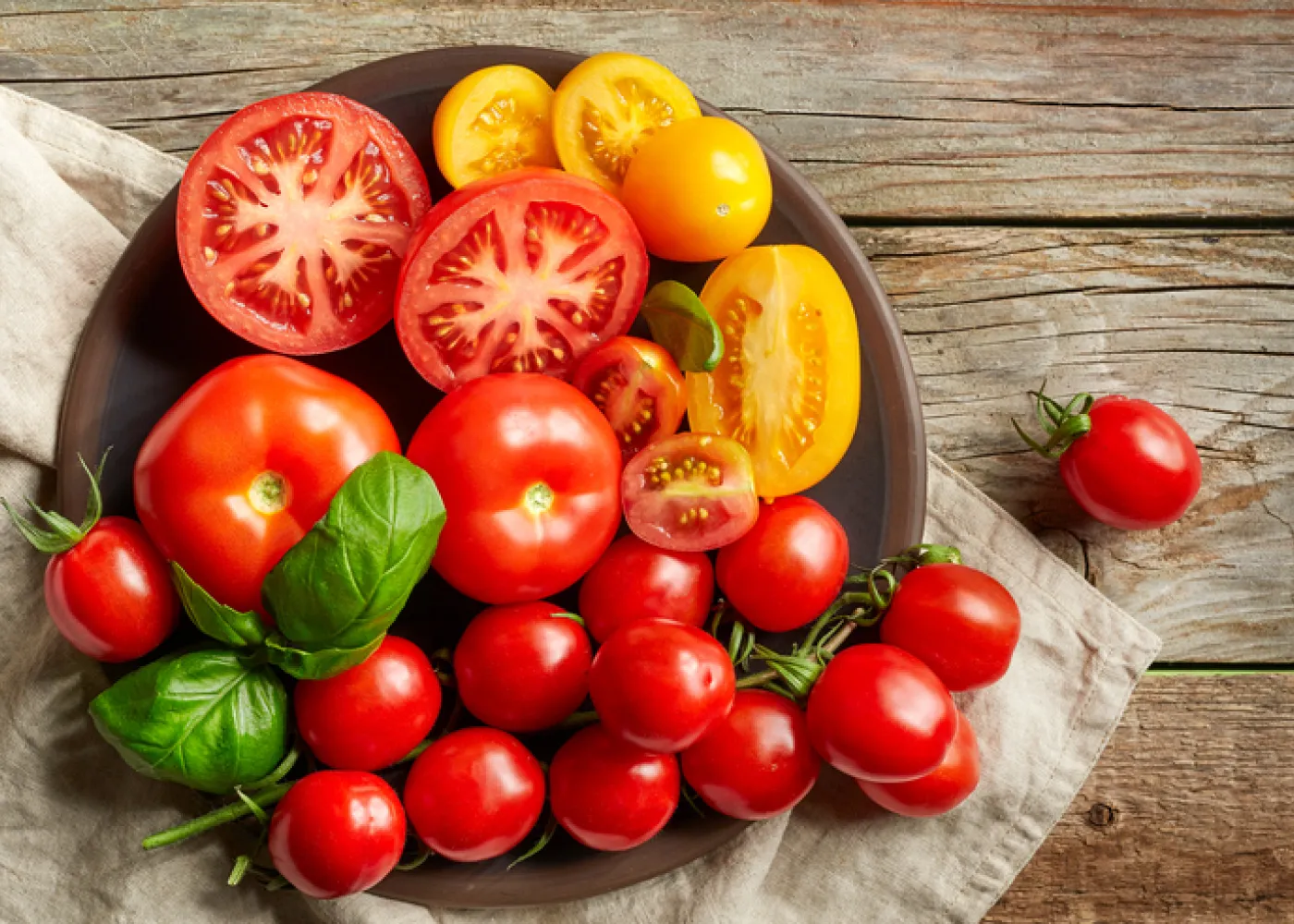
What is a Tomato?
-
Botanically, tomatoes are fruits (a berry) but are used as vegetables in savory cooking.
-
They come in many varieties: red, yellow, orange, green, even purple; cherry, plum, beefsteak, Roma, etc.
-
Commonly consumed raw (salads), cooked (sauces, soups), canned, puréed, juice, or dried.
Nutritional Profile: What’s Inside a Tomato
Here’s what you’ll find in ~100 g of raw tomato:
| Nutrient | Approximate Amount | Daily Value / Role |
|---|---|---|
| Calories | ~18 kcal | Low energy, good for weight control. |
| Water Content | ~94‑95% | Hydration support. |
| Carbohydrates | ~3.9 g (of which sugars ~2.6 g) | Provides energy, mild sweetness. |
| Fiber | ~1.2‑1.5 g | Helps digestion, gut health. |
| Protein | ~0.9‑1.0 g | Not high, but contributes to overall protein intake. |
| Fat | ~0.2 g (negligible) | Very low fat. |
Key Vitamins & Minerals
-
Vitamin C – a strong antioxidant; supports immunity, skin repair.
-
Vitamin A / Beta‑carotene – important for vision, skin.
-
Vitamin K1 – for blood clotting and bone health.
-
Folate (Vitamin B9) – cell growth, pregnancy importance.
-
Potassium – helps control blood pressure, heart function.
-
Other minerals: Magnesium, phosphorus, some iron; moderate totals.
Plant Compounds & Antioxidants
-
Lycopene – gives red color; potent antioxidant linked to lower risk of certain cancers, heart disease.
-
Beta‑carotene – precursor to vitamin A; supports vision and immune function.
-
Lutein & Zeaxanthin – especially good for eye health.

Health Benefits of Eating Tomatoes Regularly
-
Heart Health & Blood Pressure Regulation
Tomatoes are rich in potassium (which helps counteract sodium’s effect) and lycopene (for reducing LDL cholesterol, reducing arterial inflammation). Studies show regular tomato consumption (raw, sauce, or with healthy fats like olive oil) can help maintain healthier cholesterol levels and lower blood pressure. -
Cancer Risk Reduction
Lycopene and other antioxidants in tomatoes help protect cells from damage. Evidence suggests lower risks of prostate, lung, stomach and colorectal cancers among people with higher tomato intake. Cooking tomatoes often increases lycopene bioavailability. -
Skin & UV Protection
The antioxidants in tomatoes (especially lycopene, beta carotene, vitamin C) help fight free radical damage from UV rays. Regular tomato consumption or eating cooked tomato products may help reduce sunburn risk and support skin health. -
Improved Vision
Vitamin A, beta-carotene, lutein, zeaxanthin collectively support eye health, help maintain good night vision, reduce risk of macular degeneration and cataracts over time. -
Digestive Health
Fiber content and high water content in tomatoes help support gut motility, prevent constipation, and keep digestive tract function smooth. Also supports gut microbiome health indirectly through fiber and phytonutrients. -
Weight Management
Low in calories, high in water and fiber, tomatoes help you feel full, reduce overeating, and support calorie control. Adding tomatoes to meals helps bulk up meals without a lot of extra calories. -
Bone Health
Tomatoes offer vitamin K1, calcium (though not large amounts), and other minerals that contribute to bone strength and repair. They support bone health when combined with other calcium‑rich foods. -
Immune System Support
Vitamin C, vitamin A, and other antioxidants in tomatoes help boost immunity, support collagen production, help wound healing, and protect against infections.
Possible Risks & Precautions
While tomatoes are very beneficial, there are some cases and amounts for which caution is needed.
-
Acidity & Digestive Discomfort: Tomatoes are acidic (contain citric and malic acid). For people with acid reflux / GERD, ulcers, or sensitive stomachs, raw tomatoes or tomato sauce might trigger heartburn or discomfort.
-
Allergies: Some individuals may be allergic to tomatoes; symptoms may include skin rash, swelling, sneezing, irritation.
-
Kidney Stone Risk: Tomatoes contain oxalates. In people predisposed to calcium‑oxalate kidney stones or with compromised kidney function, high tomato intake may contribute to stone formation. Moderation is important.
-
Lycopene Overdose / Skin Discoloration: Extremely high consumption of lycopene (very rare) may lead to lycopenodermia (orange tint of skin). Not common from normal dietary intake.

Qualities That Make Tomatoes Unique
-
Versatility: You can eat tomatoes raw, cooked, canned, pureed, juiced, grilled, etc. Cooking often increases absorption of certain nutrients (especially lycopene).
-
Flavor Profile: Tangy, sweet, savory, umami‑rich. Adds depth to sauces, soups, salads.
-
Color & Appeal: The bright red (or yellow/orange) color is appealing; signals healthy phytonutrients.
-
Affordability & Availability: Widely produced and consumed in many countries; many varieties to suit climatic conditions.
-
Low Calorie with High Nutritional Yield: Because most of its weight is water, and fat is negligible, the nutrient‑to‑calorie ratio is excellent.
How to Get the Most Out of Tomatoes
-
Eat both raw & cooked: Raw gives good vitamin C; cooked or processed (with healthy fats like olive oil) increases lycopene absorption.
-
Use whole tomato parts: Skin and seeds hold fiber and phytochemicals. Unless someone has digestive sensitivity.
-
Pair with healthy fats: Olive oil, avocado, nuts help absorption of fat‑soluble compounds.
-
Don’t overdo processed tomato products (e.g. heavily salted sauces, ketchup with sugar) to avoid excess salt / sugars.
-
Choose ripe, fresh tomatoes; variety also matters (different colors have different antioxidant profiles).
SEO Keywords & Tags
To help this article rank and be Google‑indexable, use these keywords & tags:
Keywords:
-
Tomato health benefits
-
Tomato nutrition facts
-
Benefits of eating tomatoes daily
-
Tomatoes and heart health
-
Lycopene in tomatoes
-
Tomatoes for skin health
-
Risks of too many tomatoes
-
Tomato vitamin C and potassium
Suggested Meta Description:
“Discover the nutritional power of tomatoes: how eating tomatoes regularly can benefit your heart, skin, eyes & digestion. Learn about nutrients, risks, and best ways to include tomatoes in diet.”
Tags:
-
#TomatoBenefits #HealthFood #Nutrition #HeartHealth #Antioxidants #SkinCare #WeightLoss #HealthyEating
Conclusion
Tomatoes are much more than a common salad item or cooking staple—they are a health‑boosting food rich in antioxidants, vitamins, minerals, fiber, and flavor. Regular consumption supports heart health, reduces cancer and disease risk, improves skin & vision, aids digestion, and helps with weight management.
While most people can safely enjoy tomatoes daily, those with digestive sensitivity, kidney issues, or allergies should monitor intake. Balanced usage—raw & cooked, fresh & processed in moderation, paired with healthy fats and other nutrient‑rich foods—unlocks the full potential of this red gift from nature.

You must be logged in to post a comment.